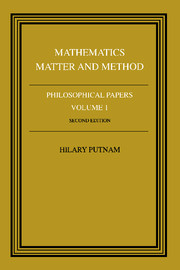Book contents
- Frontmatter
- Contents
- Dedication
- Introduction
- 1 Truth and necessity in mathematics
- 2 The thesis that mathematics is logic
- 3 Mathematics without foundations
- 4 What is mathematical truth?
- 5 Philosophy of physics
- 6 An examination of Grünbaum's philosophy of geometry
- 7 A philosopher looks at quantum mechanics
- 8 Discussion: comments on comments on comments: a reply to Margenau and Wigner
- 9 Three-valued logic
- 10 The logic of quantum mechanics
- 11 Time and physical geometry
- 12 Memo on ‘conventionalism’
- 13 What theories are not
- 14 Craig's theorem
- 15 It ain't necessarily so
- 16 The ‘corroboration’ of theories
- 17 ‘Degree of confirmation’ and inductive logic
- 18 Probability and confirmation
- 19 On properties
- 20 Philosophy of Logic
- Bibliography
- Index
18 - Probability and confirmation
Published online by Cambridge University Press: 04 August 2010
- Frontmatter
- Contents
- Dedication
- Introduction
- 1 Truth and necessity in mathematics
- 2 The thesis that mathematics is logic
- 3 Mathematics without foundations
- 4 What is mathematical truth?
- 5 Philosophy of physics
- 6 An examination of Grünbaum's philosophy of geometry
- 7 A philosopher looks at quantum mechanics
- 8 Discussion: comments on comments on comments: a reply to Margenau and Wigner
- 9 Three-valued logic
- 10 The logic of quantum mechanics
- 11 Time and physical geometry
- 12 Memo on ‘conventionalism’
- 13 What theories are not
- 14 Craig's theorem
- 15 It ain't necessarily so
- 16 The ‘corroboration’ of theories
- 17 ‘Degree of confirmation’ and inductive logic
- 18 Probability and confirmation
- 19 On properties
- 20 Philosophy of Logic
- Bibliography
- Index
Summary
The story of deductive logic is well known. Until the beginning of the nineteenth century, deductive logic as a subject was represented by a finite and rather short list of well known patterns of valid inference. The paucity of the subject did not discourage scholars, however – there were professorships in Logic, courses in Logic, and volumes – fat, fat volumes – in Logic. Indeed, if anyone wants to see just how much can be made out of how little subject matter, I suggest a glance at any nineteenthcentury text in traditional logic. The revolution in the subject was brought about by the work of the English logician Boole.
Boole's full contribution to the mathematics of his time has still to be fully appreciated. In addition to creating single handed the subject of mathematical logic, he wrote what is still the classic text on the subject of the calculus of finite differences, and he pioneered what are today known as ‘operator methods’ in connection with differential equations. To each of the subjects that he touched – calculus of finite differences, differential equations, logic – he contributed powerful new ideas and an elegant symbolic technique. Since Boole, mathematical logic has never stopped advancing: Schröder and Pierce extended Boole's work to relations and added quantifiers; Behmann solved the decision problem for monadic logic; Löwenheim pioneered the subject that is today called ‘model theory’ Russell extended the system to higher types; and by 1920, the modern period in the history of the subject was in full swing and the stage was set for the epochal results of Godel and his followers in the 1930s.
- Type
- Chapter
- Information
- Mathematics, Matter and MethodPhilosophical Papers, pp. 293 - 304Publisher: Cambridge University PressPrint publication year: 1979
- 1
- Cited by



